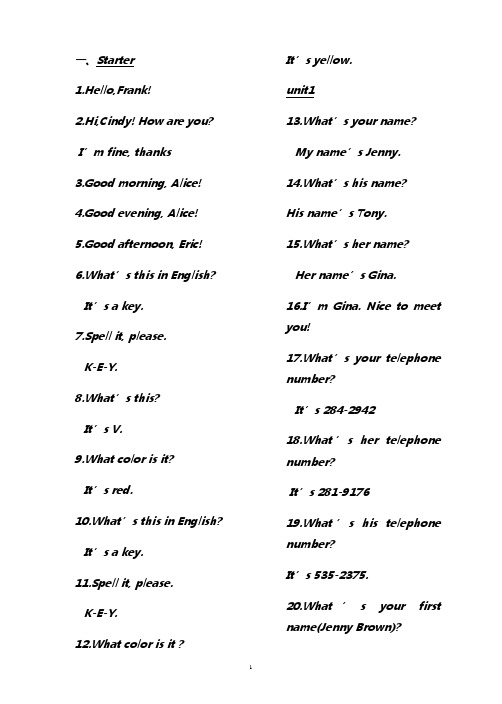句型复习
- 格式:ppt
- 大小:252.50 KB
- 文档页数:17


宾语从句1. 定义:在句中充当宾语的从句称为宾语从句。
2. 连接词:连接词是否有意义是否做成分是否可以省略that无意义在不影响句意的情况下,可省略从属连词whether,if 有意义,“是否”不作成分,从句完整不可省略连接代词who, whom,whose,what, which,whoever, whichever,whatever作成分,从句不完整连接副词when, where, why,how有意义作状语,句子完整不可省略3. that引导的宾语从句that引导宾语从句时,由于只起连接作用,本身没有意义,所以常常省略,特别是在believe, think, know, say等动词的后面。
Eg: He believed (that) that man was a criminal.The girl knows (that) her parents won’t lie to her.Do you think (that) our team will win the game.There is no doubt (that) it’s going to rain soon.4. if、whether引导的宾语从句(1)if、whether引导宾语从句时,意为“是否”,不可省略Eg: I don’t know if/whether he will come.Bill wondered if/whether he could get some advice from his friends.(2)一般情况下,if和whether可互换使用,但在以下情况通常用whether,不用if① 当宾语从句位于主句之前Eg: Whether they can help you, I’m not sure.② 与or连用时Eg: I wonder whether he will pick me up or not.③ 与动词不定式连用时Eg: They don’t decide whether to visit their teachers.④ 作介词的宾语时Eg: It depends on whether we can get the permission.5. 连接代词引导的宾语从句连接代词who, whom,whose, what, which, whoever, whichever, whatever具有意义,除了连接主从句外,还在从句中充当句子成分,可作主语、宾语、表语和定语。

小学语文句子专项复习,四种句子类型和句型转换,附答案解析一、什么是句子?句子是由词和词组构成的,能够表达完整的意思的语言单位。
二、组成形式:“谁(什么、哪里)”“做什么(是什么、怎么样)”即:谁干什么。
哪里怎么样。
什么是什么。
三、句子的类型按照用途和和语气分类:(一)、陈述句(二)、疑问句(三)、祈使句(四)、感叹句1、陈述句是用来告诉别人一件事或说明一个道理的句子,表示陈述的语气。
陈述句语调平缓,书面语句尾一般用句号。
例如:1.晓明的妈妈是教师。
2.明天我们去春游。
3.天空中撒满了亮闪闪的星星。
陈述句的分类按照表达内容,陈述句可分为肯定句和否定句。
肯定句是表达肯定意思的句子否定句是表达否定意思的句子。
否定句又可分为一般否定句和双重否定句。
一般否定句表达的是否定的意思,双重否定表达的是肯定,比肯定句强。
为了简明地了解陈述句的分类,我们用下面的图表来表示:2、疑问句用来提一个问题的句子叫疑问句。
疑问句句尾语调上升,常带有疑问词“呢、吗、呀、么‥‥‥”疑问句书面语的句末用问号。
例如:1、这本书是你的吗?2、你吃过午饭了吗?3、他在院子里做什么呢?(1)疑问句的分类疑问句可分为疑问句、反问句和反问。
①有疑而问句是问话者提出问题,要求别人回答的句子。
包括一般问句,选择问和是非问。
②反问句是一种无疑而问,是为了加强说话力量而采用的一种方式,实际上是陈述句的一种强调用法。
③设问句也是一种无疑而问,是为了引起读者或听者注意而采用的一种方式。
(2)为了简明地了解疑问句的分类,我们用下面的图表来表示。
3、祈使句用来表示命令、请求、希望、禁止或劝阻等意思的句子叫祈使句。
祈使句书面语的句末根据语气的强弱,可以用感叹号,也可以用句号。
语气强用感叹号,语气弱用句号。
如:请把书递给我。
不许随地吐痰﹗把枪放下,举起手来﹗祈使句的分类根据语气的强弱,祈使句可以分为要求和禁止两类。
祈使句要求委婉,祈使句禁止严厉强势。
4、感叹句用来抒发强烈感情(喜欢、愤怒、悲伤、或恐惧、惊讶、厌恶等),表示感叹语气的句子叫感叹句。

一、Starter1.Hello,Frank!2.Hi,Cindy! How are you?I’m fine, thanks3.Good morning, Alice!4.Good evening, Alice!5.Good afternoon, Eric!6.What’s this in English? It’s a key.7.Spell it, please.K-E-Y.8.What’s this?It’s V.9.What color is it?It’s red.10.What’s this in English? It’s a key.11.Spell it, please.K-E-Y.12.What color is it ?It’s yellow.unit113.What’s your name?My name’s Jenny.14.What’s his name?His name’s Tony.15.What’s her name?Her name’s Gina.16.I’m Gina. Nice to meet you!17.What’s your telephone number?It’s 284-294218.What’s her telephone number?It’s 281-917619.What’s his telephone number?It’s 535-2375.20.What’s your first name(Jenny Brown)?Jenny.21.What’s your last name? (Jenny Brown)Brown.22.What’s his first name(Jim Smith)?Jim23.What’s his last name? Smith.24.What’s her first name(Gina Green)?Gina.25.What’s her last name?Green.unit226.Is this your pencil?Yes, it is.NO, it isn’t.27.Is this my pen?Yes, it is.NO, it isn’t.28.Is that his book? Yes, it is.NO, it isn’t.29.Is that her eraser?Yes, it is.NO, it isn’t.30. What’s this in English?It’s a pen.31. How do you spell it?P-E-Nunit332. Is this your sister?Yes, it is. /No, it isn’t.33. Is that your brother?Yes, it is. /No, it isn’t.34. This is my friend.These are my friends.35. That is my brother.Those are my brothers.36.That’s Anna and that’s Paul.37. Is she your sister?Yes, she is.38 Is he your brother?No, he isn’t. He’s my friend.39.These are my parents. This is my grandmother. This is my friend, Li Fang.Unit 41. Where is my baseball?It’s in the backpack.2. Where is my computer game?It’s under the bed.3. Where are your books?They are on the chair.4. Where are his/her keys?They are on the dresser.5. Is your notebook on the table? Yes, it is. / No, it isn't.6. Are my English books in the drawer?Yes, they are. / No, they aren't.7. Where are my books?I don’t know. Are they on the bed?No, they don’t.8. Dear Feifei,Please take these things to your sister: her hat, watch, and ID card. The hat is on the dresser. The watch is under the bed. The ID card is on the table.Thanks,Grandma9. Can you bring some things to school?10. Here is my room. My hat is on the chair. My Baseball isunder the bed. And those are my CDs. They’re in my backpack.Unit 51. Do you have a TV?Yes, I do. I have a TV.NO, I don't. I don’t have a TV.2. Do they have a computer? Yes,they do. They have a computer.No, they don't. They don’t have a computer3.Does he/she have a tennis racket?Yes, he/she does. He/She has a tennis racket.No, he/she doesn't. He/She doesn’t have a tennis racket4. Let's play soccer.That-sounds-good/interesting /fun/great/boring.5. I have 8 basketballs, 2 baseballs and 3 volleyballs. She/He has a sports collection.Unit 61. Do you like salad?Yes, I do. I like salad. No, I don't. I don’t like salad.2. Do they like French fries?Yes, they do. They like French fries.No, they don't. They don’t like French fries.3. Does he/she like pears?Yes, he/she does. He/She likes pears.No,he/she doesn't. He/She doesn’t like pears.4. They like salad.They don't like salad.5. She/He likes bananas.6. She/He doesn't like bananas.7. I like oranges but I don't like apples.8. I like oranges.I don't like oranges.9. For breakfast, Tom likes eggs, bananas and apples. For lunch, he has hamburgers, salad and pears.And for dinner, he likes chicken, tomatoes and broccoli.Unit71 How much is the red sweater? It’s eight dollars.2 How much is this blue skirt? It’s seven dollars.3 How much is that white bag? It’s nine dollars.4 How much are these black pants? They’re ten dollars.5 How much are those blue socks?They’re three dollars.6 Can I help you? / What can I do for you?Yes, please. / No, thanks.7 That’s too expensive!That’s fine, I’ll take it.8 We have sweaters at a very good price.9 Anybody can afford our prices!。

句型转换总复习(二)一般疑问句及否定句一、含有be动词的陈述句变一般疑问句和否定句1 The student is at school.(否定句)(一般疑问句)(回答)__________ ______________2 The students are at school.(否定句)(一般疑问句)(回答)__________ ______________3 His father is an English teacher.(否定句)4 These cats are crying.(否定句)(一般疑问句)(回答)__________ ______________5 He is crying under the tree.(否定句)(一般疑问句)(回答)__________ ______________6 His birthday is on the twentieth of November.(否定句)7 Mrs. Li and Kitty are in a big shop.(一般疑问句)(回答)__________ ______________8 Everybody is in the classroom.(否定句)(一般疑问句)(回答)__________ ______________9 The boy under the tree is hungry.(否定句)(一般疑问句)(回答)__________ ______________10 Your brother’s aunt is on the chair.(否定句)11 There’s an eraser on the desk.(否定句)(一般疑问句)(回答)__________ ______________12 Those are your keys.(一般疑问句)(回答)__________ ______________13 John is his first name.(否定句)(一般疑问句)(回答)__________ ______________14 My father is fine.(否定句)(一般疑问句)(回答)__________ ______________15 This is a short.(否定句)16 There’re two pens in the pencil case.(否定句)17 The boys are my goog friends.(否定句)二、不含be动词(即含行为动词)的陈述句变一般疑问句和否定句1 They can swim.(一般疑问句)(回答)__________ _________2 I like to read English.(否定句)(一般疑问句)(回答)__________ ______________3 I go to school on foot. (否定句)4 He likes English.(否定句)(一般疑问句)(回答)__________ ______________5 His father goes to work by bus(否定句)(一般疑问句)(回答)__________ ______________6 He goes to school every day.(否定句)7 I want to have a model car.(一般疑问句)(回答)__________ ______________8 She wants a cup of coffee.(否定句)(一般疑问句)(回答)__________ ______________9. I do my homework after school.(否定句)10. The boy does some housework at home.(否定句)(一般疑问句)(回答)__________ ______________11. The children had a good time in the park. (否定句)(一般疑问句)(回答)__________ ______________12 Jim has some story-books.(否定句)作业1.His sister has computer games(改为一般疑问句)______his sister _______ computer games?2. Ann and Mary have baseballs(改为一般疑问句)_______ Ann and Mary _______ baseballs?3.She has some pens. (同上) _____she _____ ________pens?4.We like fruit and eggs.( 同上) _____ _____ _____ fruit _____ eggs.5.I want to go to a movie.( 同上)______you ______to go to a movie?6. I can play ping-png.( 改为一般疑问句) ______can you _____?7.She can run fast.( 改为一般疑问句) _____ _____run fast?8.Those are their pencil cases.(改为一般疑问句,并作肯定回答)_____ ______ their pencil cases?.9.He is an English teacher.(改一般疑问句)______ he an English teacher?10.She has a backpack.(否定句) she _______ ________ a backpack.11.Jim can play computer games. (否定句)Jim _______ _______ computer games.12. He likes pens.( 否定句) He_______ _________pens.13.I know her name(改否定句) I _____ know her name.14.She likes volleyball.(否定句) She____ _____ volleyball15.That is his dictionary. (否定句) That ____ his dictionary16. My brother wants to join the music club .(改为否定句)17.My brother ______ ________ to join the music club18.Gina doesn’t play golf every day (改为肯定句) Gina ______ golf every day19. Do you have tennis rackets? (改为肯定句)______ _______ tennis rackets.20.Jim doesn’t have a ba g.(肯定句) Jim _____a bag. 44.Can you sing ?(作否定回答)_____,I _____ .21.Does he like speaking English ?(作肯定回答)______ ,he ______ _______ .22.Can Jane speak Chinese?(否定回答) ______,_____ _____23.Is this boy your brother? (肯定回答) ____, _____ ____24.Are those her books?否定回答)___, ______ ____二、把下面的句子变成否定句 1. They like French fries. They __ __ ___ __ French fries.2. Sandra likes watching TV. Sandra ____ ____ watching TV3. My father has breakfast at home. My father ________ ______breakfast at home.4. The shop sells clothes. The shop _____ _____ clothes.5.I draw pictures on the wall. I ______ ________ pictures on the wall.6. I do my homework at 7:00. I _____ _____ my homework at 7:00.7. They are my brothers. They _________ _________ my brothers8.My last name is Smith. My last name ______ _______ Smith9. This is my grandmother. This _______ my grandmother.10. These are her brothers. These _______ her brothers.11. There are some notebooks in my backpack. There ___ ___ notebooks in my backpack.12. There are some nice tomatoes here. There ________ ________nice tomatoes here.13. Is he your friend?(肯定回答) ________, _________ _________.14. Are they your teachers?(否定回答) ________, _________ _________.15. Can you bring the ruler to me? (否定回答)No, ________ ________.16. Is this Lucy’s room?(否定回答),17. Is it on the dresser? (作否定回答) __________, it __________.18. Does she like eggs for dinner? (否定回答) _________, she __________.19. Does Tom like eggs for breakfast?(否定回答)_____ , ______ _________.20. She doesn’t have meat for lunch.(变为肯定句) She ________ meat for lunch.21. I have some English books.(否定句)I _______ ______ _______ English books.22. She has some pictures.(一般疑问句)______ _____ _______ _______ pictures?23. I read the book yesterday. (一般疑问句)________ ________ _______ the book yesterday?。

小学英语常用基础句型基础句型1:There+be +主语+地点状语/ 时间状语There’s a boat in the river.河里有条船。
基础句型2:What’s wrong with+sb. / sth.?What’s wrong with your watch?你的手表有什么毛病?基础句型3:How do you like...?How do you like China?你觉得中国怎么样?基础句型4:What do you like about...?What do you like about China?你喜欢中国的什么?基础句型5:had better(not)+动词原形You’d better ask that policeman over there.你最好去问问那边的那个警察。
基础句型6:How+adj. / adv. +主语+谓语!What a/an+adj.+n.+主语+谓语!How cold it is today!今天多冷啊!What a fine picture it is!多美的一幅图画呀!基础句型7:Thank+sb.+for(doing)sth.Thank you for coming to see me.感谢你来看我。
基础句型8:So+be/ 情态动词/ 助动词+主语He is a student. So am I. 他是一个学生,我也是。
... not ... until ...He didn’t have supper until his parents came back.直到他的父母回来他才吃饭。
基础句型10:比较级+and+比较级The baby cried harder and harder. 那孩子哭得越来越厉害。
基础句型11:the+比较级,the+比较级The more one has,the more one wants.越有越贪。
小学语文句式归类复习一、句子部分【复要点】1、知道什么是句子,从气和作用上了解句子的型。
2、句和句。
3、几种常的修辞手法。
4、并修改常的病句。
5、行句式。
6、掌握点符号的用法。
【知平台】(一)句子及其型1、什么是句子。
句子就是由或构成的,能表达一个完整的意思,其成形式是“ (什么、哪里)”加“做什么(是什么、怎么)”。
例如:在明亮的教室里真地学知。
2、分辨述句、疑句、祈使句、感句四种句子型。
述句:能告人一件事的句子,句末用句号。
如:我游了城。
疑句:向人提出的句子,句末用号。
如:日子什么一去不复返呢?祈使句:向人得出要求的句子,句末一般用句号,有也用感号。
如:油重地,勿吸烟!感句:有快、惊、等厚感情的句子,句末用感号。
如:我的生活多幸福啊!(二)改句式【考点】同一个意思可以采取多种形式行表达。
表达式不一,言效果也不一。
句式,就是把一个句子改另一个句子,意思不。
常的有:1、把字句、被字句、述句的互;2、肯定句、双重否定句的互;3、述句、反句、感句的互;4、直接引用和述句互。
一、把字句、被字句、述句的互。
“把”字句:用“把”字将作和象提到作前面,并在作前面加上“把”字的句型。
“被”字句:将接受作的象提到作生者的前面,并在作生者的前面加上一个“被”字的表被的句子型。
“把”字句、“被”字句、述句有密切的关系,可以互相,但意思不能改。
例如:他地握住了老人的手。
(被字句、把字句)(分析)被字句,主与位置后加“被”字,“把”字句,如果是“被”字句,将主与的位置加“把”字,如果是述句将“把”字放在前,放在句子末尾。
他把老人的手地握住了。
(把字句)老人的手被他地握住了。
(被字句)二、述句、反句、感句的互反句并不是向方提出,需要方回答,而是用反(追)的气某个,表达某种感情。
它是句的一种特殊形式,并不需要回答,答案就在句中,句末用号;述句感句,一般加“多么”、“太”、“真”等,句末要加上感“啊”、“呀”等,将句号改感号。
高中英语句型总结大全及答案一、基本句型1.Subject + Verb–Example: He plays basketball.2.Subject + Verb + Object–Example: She eats an apple.二、肯定句型1.Subject + Be (am/is/are) + Adjective/Noun–Example: She is beautiful.2.Subject + Verb + Complement–Example: He looks happy.三、否定句型1.Subject + Do/Does/Did + Not + Verb–Example: They do not like ice cream.2.Subject + Be (am/is/are) + Not + Adjective/Noun–Example: It is not easy.四、疑问句型1.Be (am/is/are) + Subject + ?–Example: Are you ready?2.Do/Does/Did + Subject + Verb + ?–Example: Did she finish her homework?五、特殊句型1.There + Be + Subject + (Adjective/Noun)–Example: There is a cat on the table.2.It + Be (am/is/are) + Adjective/Noun + (for + Subject) + to + Verb–Example: It is important for us to study hard.六、答案示例1.肯定回答:•Yes, I am.•Yes, she did.2.否定回答:–No, they are not.–No, it is not mine.结语以上是高中英语句型总结大全及答案的内容,希望对您有所帮助并提升英语表达能力。